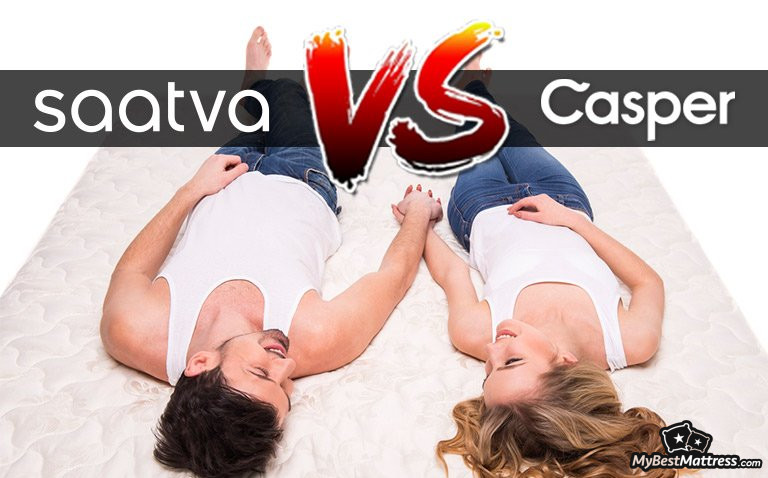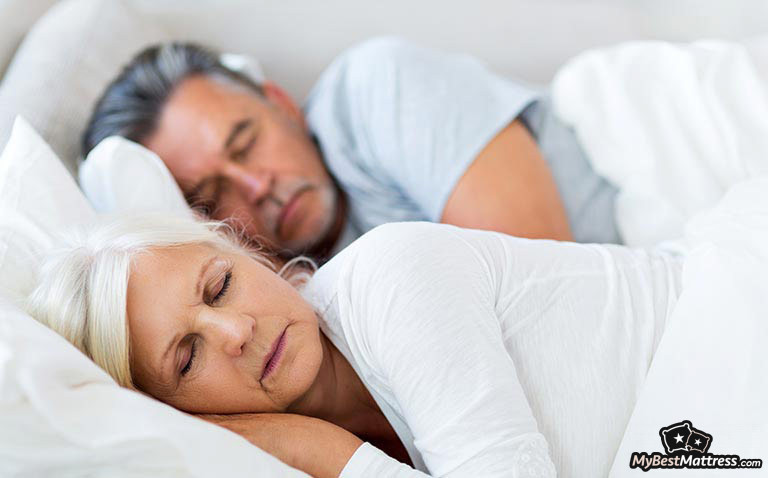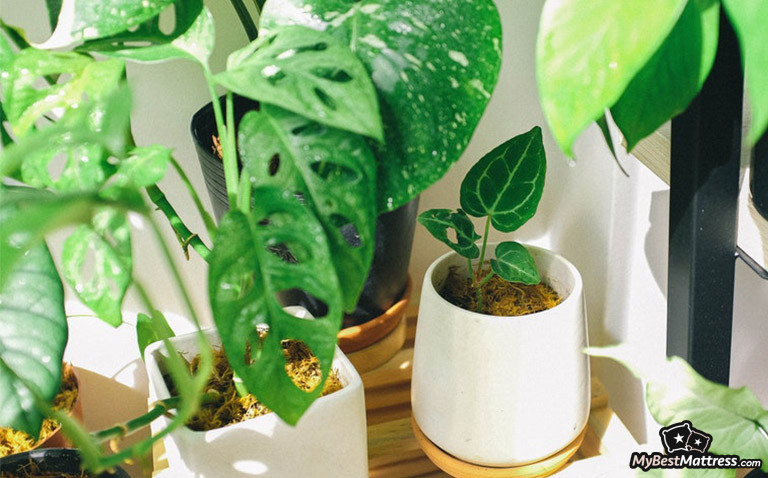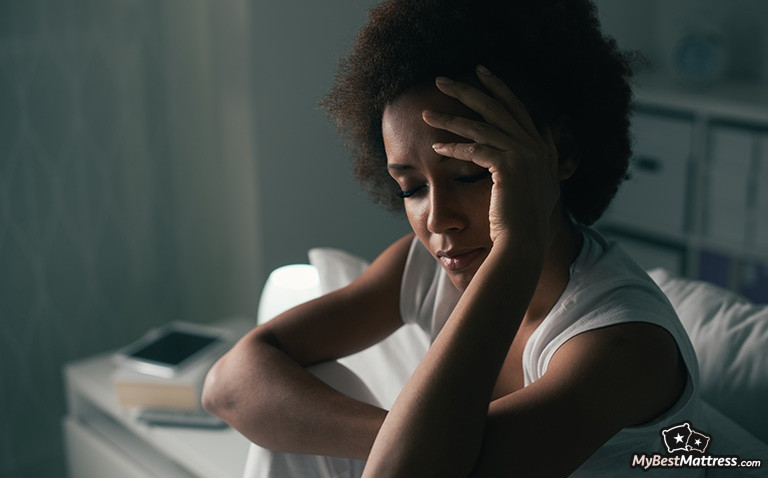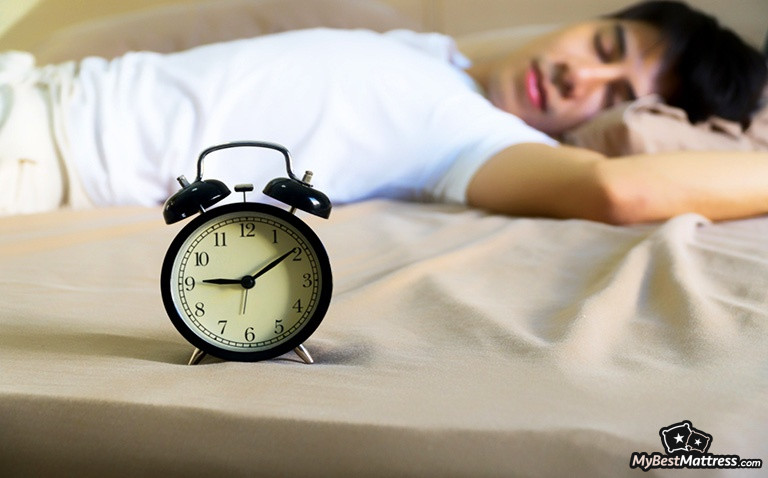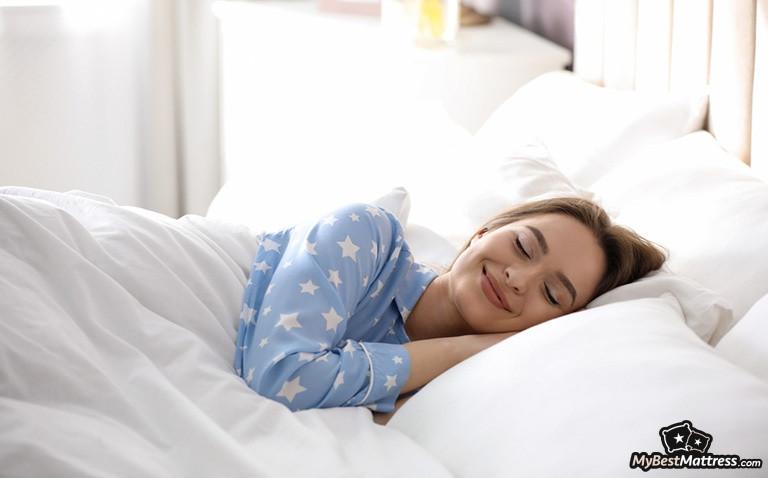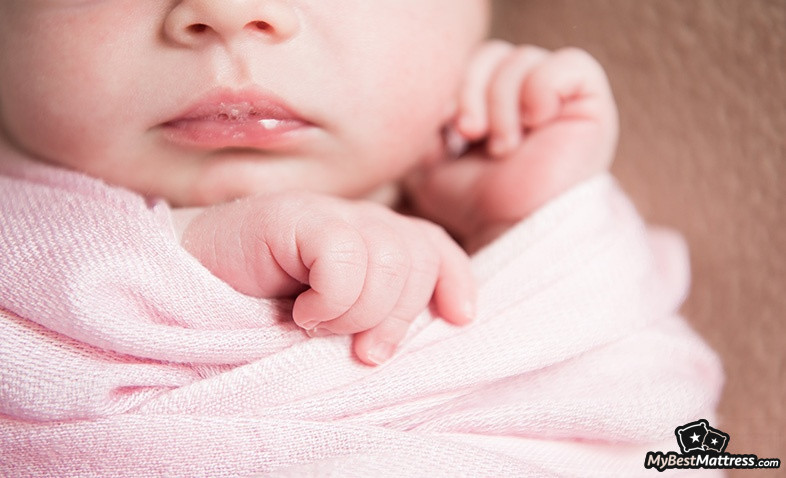
Whether you’d like to admit it or not, every one of us has woken up on a pillow with a drool puddle on it at least once in our lives. As common and embarrassing as it might seem to some, especially those that don’t sleep alone, there is more to this awkward occurrence than a short answer to “how to stop drooling” on Google.
Being an indicator of both good and more serious things, drooling in your sleep certainly shouldn’t be ignored. If it starts occurring more often it might be time to seek professional medical assistance.
So, what causes drooling while sleeping? And is there really a way to avoid it completely? Find out that and more, all in one article.
Table of Contents
- 1. Is Drooling Normal?
- 2. What Causes Drooling?
- 2.1. Sleep Apnea
- 2.2. Asthma
- 2.3. GERD
- 2.4. Sleeping Position
- 2.5. Nasal Blockage
- 2.6. Allergies
- 2.7. A Side Effect of Medicine
- 3. How to Stop Drooling?
- 3.1. Sleep Apnea
- 3.2. Asthma
- 3.3. GERD
- 3.4. Sleeping Position
- 3.5. Nasal Blockage
- 3.6. Allergies
- 3.7. A Side Effect of Medicine
- 4. What Is The Best Sleeping Position?
- 5. Conclusions
Is Drooling Normal?
Waking up with a puddle of drool on your pillow is never a pleasant feeling. Believe me, I know. But don’t we all? Everyone has felt it at least once in their lives. This just goes to show that yes, drooling in your sleep is completely normal.
Whether it has been happening since your childhood or you’ve started noticing it only recently, you don’t need to feel ashamed about it, as drooling while sleeping is much more common than you might think.
Due to popular media, and especially cartoons targeted at children, usually showing drooling while sleeping as something laughable and embarrassing, people can develop insecurity about something completely normal.
In fact, drooling while sleeping might even be considered a good thing in most cases, as it’s most likely to happen with complete relaxation of your body in your sleep, which shows a high quality of deep sleep and a complete sleep cycle.
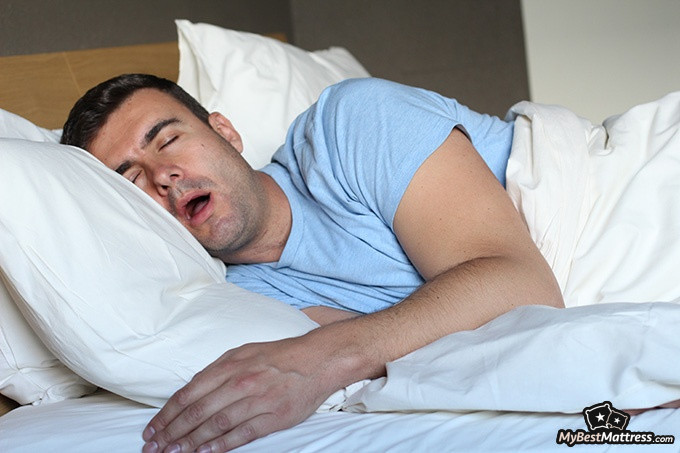
So, if you sometimes wake up to find that you’ve been drooling in your sleep you should definitely be happy, as you just slept like a baby - literally!
But what to do if a wet pillow is a more common occurrence than once or twice per month? Is regular drooling while sleeping something to worry about? How to stop drooling in your sleep if it has become concerningly excessive?
What Causes Drooling?
If you’ve ever wondered to yourself “how to stop drooling in your sleep?”, chances are it has become a more regular occurrence than a couple of times every month.
Excess production of saliva is commonly known as hypersalivation or sialorrhea and doesn’t always point to an underlying medical condition. However, that doesn’t mean that it should be ignored completely.
There are many different reasons that can cause unusual amounts of drooling while sleeping, but only some might require booking an appointment with your GP.
Sleep Apnea
Oftentimes drooling while sleeping isn’t caused by excessive saliva production, but by sleeping with an open mouth. Even though there can be many things causing this, one of them is notably concerning.
Sleep apnea is a sleep disorder that causes restricted airways to hinder your ability to breathe in your sleep. The sufferers occasionally stop breathing in their sleep for short periods of time. This in turn encourages breathing through one’s mouth, which leads to drooling in your sleep.
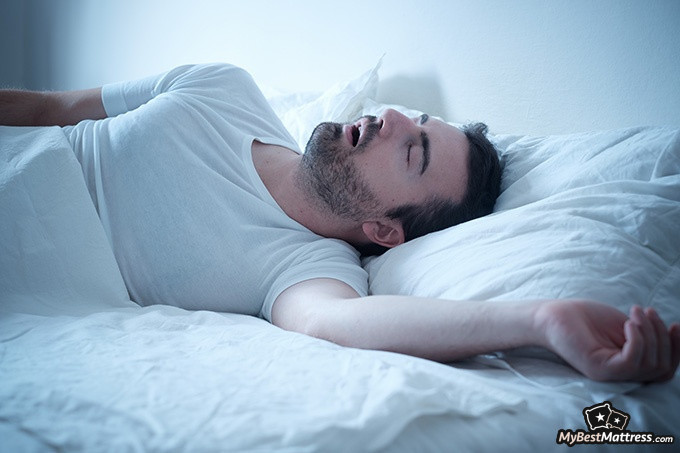
This condition can potentially be lethal, as it can lead to suffocation if left untreated. If drooling in your sleep makes you think you might have sleep apnea, look out for other symptoms - loud snoring, feeling tired during the day, and a dry or sore throat in the morning.
Sleep apnea, and in turn drooling in your sleep, can be caused by many things. Some of them include:
- Excess weight;
- Using sedatives or tranquilizers;
- Regularly drinking alcohol;
- Smoking.
If you’ve started noticing excessive drool puddles in the morning see a medical specialist as soon as possible, as drooling while sleeping might be an early warning sign of sleep apnea.
Latest Saatva Coupon Found:
UP TO $500 OFF
Limited-time Saatva Sale
We're sharing a limited-time Saatva mattress discount with our readers! Grab this deal & enjoy your new mattress with huge discounts.
Asthma
Sometimes drooling in your sleep can be a side effect of a chronic condition, whether it’s more serious or something that can be learned to deal with.
Though it is a lot more common in children and becomes less of a nuisance over time, asthma can affect adults as well, causing many sufferers to experience the unpleasantly wet morning surprises.
Similarly to sleep apnea, asthma can cause restricted breathing during the night. In turn, the labored breathing can lead to trying to catch your breath through your mouth and, naturally, drooling while sleeping.
Even though there isn’t much you can do to completely stop drooling while sleeping in this case, using your inhaler before bed can help lessen the side effect. In addition, if you notice nighttime salivation getting worse, discuss possible following steps with your GP.

Did you know?
Have you ever wondered which mattresses are approved as the best for sleep?
See & compare TOP mattresses side by sideGERD
Those of you who have been wondering how to stop drooling while asleep have probably considered everything under the sun, apart from your last night’s dinner. Believe it or not, but the food you eat before bed can literally make your mouth water more. However, not always due to a pleasantly scented dream full of treats.
If you have a sensitive stomach, eating more irritating or difficult-to-digest foods may encourage acid reflux. Occasional acid reflux can cause a wet pillow from time to time, but can easily be fixed by avoiding specific ingredients.
However, if night-time drooling becomes a regular occurrence and you start experiencing reflux-related discomfort, it might be time to get checked for gastroesophageal reflux disease, more commonly referred to as GERD.
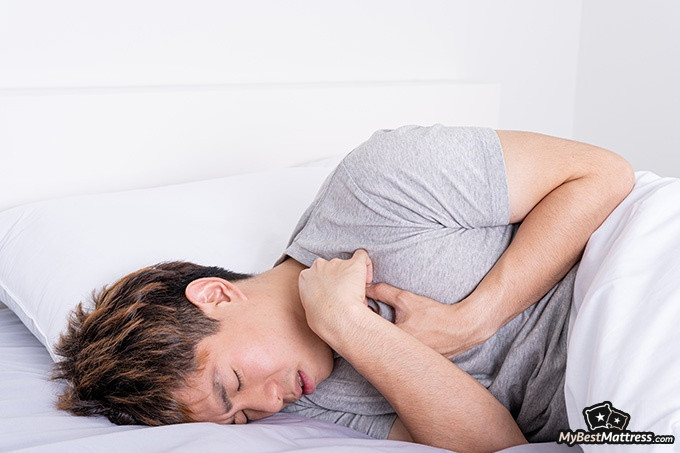
To put it in simple terms, GERD is chronic acid reflux, which can not only cause drooling while sleeping but more serious health complications, such as open sores in the esophagus or even a heightened risk of throat cancer.
Though GERD can be irritated by specific food products, such as alcohol, chocolate, or greasy foods, actual causes go much deeper:
- Smoking;
- Obesity;
- Hernias;
- Certain medicines, such as aspirin.
Alright, we’ve discussed what can lead to GERD and acid reflux. But how does GERD cause excessive salivation at night?
As the stomach acid irritates the esophagus, extra saliva is produced to soothe the burning. In addition, many GERD sufferers report it feeling like a lump in your throat that hinders your ability to swallow, which perfectly explains why excess saliva might pool in your mouth at night.
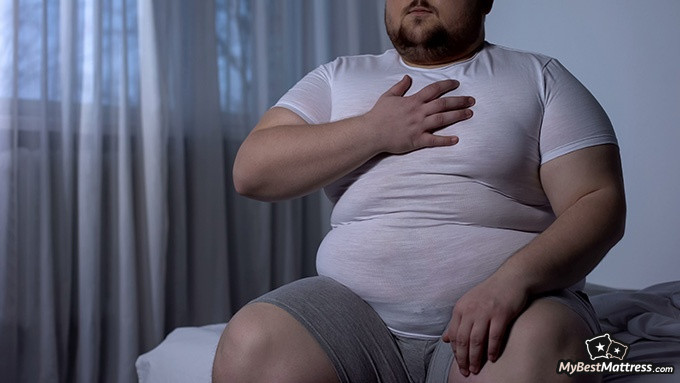
Out of the medical causes listed in this article of drooling in your sleep, GERD and acid reflux is some of the more serious and most likely to lead to complications. So if you notice a correlation between drooling while sleeping and eating some reflux-inducing foods, it might be time to seek professional medical help.
Sleeping Position
Now, we’ve discussed the more serious possible causes of drooling in your sleep. And it’s perfectly normal to want to eliminate the most concerning options first. However, many people that look up “how to stop drooling” rarely expect the suspect to be much closer to home than they might think.
If you’ve already eliminated asthma, sleep apnea, and even GERD from your list, then it might be time to take a sigh of relief, as the reason is most likely completely harmless.
For example, the most simple answer to the age-old question “why do I drool when I sleep?” is that it’s most likely due to your sleeping position.
Yes, it’s that simple.
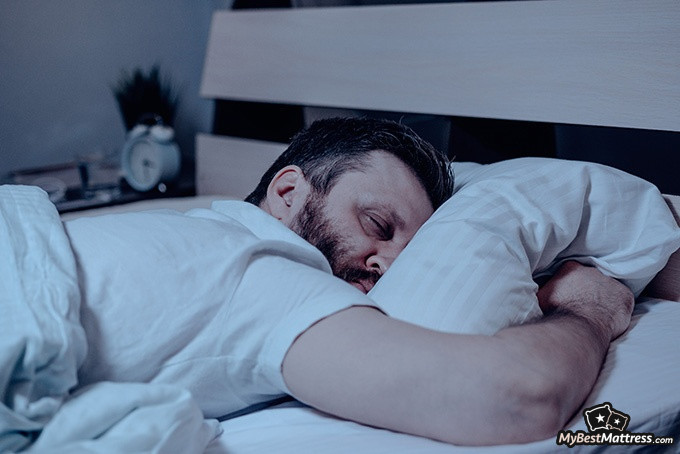
Research[1] says that it’s most common to sleep on your side, followed by your back and your stomach. This sleep position is said to allow your body to rest and relax the most, leading to the best quality of sleep.
As I've already mentioned, the better you sleep, the more likely you are to wake up with a little puddle of drool on your pillow. However, even if higher sleep quality wasn’t related to your sleeping positions, they could still encourage drooling in your sleep to occur.
The explanation is very simple - while sleeping on your side or stomach, your face presses on the pillow. The squished cheeks can involuntarily make your mouth open, and as saliva pools to one side of your mouth, it just happens that it escapes onto your face and pillow.
It might feel a little disappointing to find out that the main culprit behind your nightly salivation is nothing more but gravity and the position you sleep in, especially because you have little control over both of these factors. However, this is definitely better news than finding out that you have some much more serious health problems that are causing the slobber.
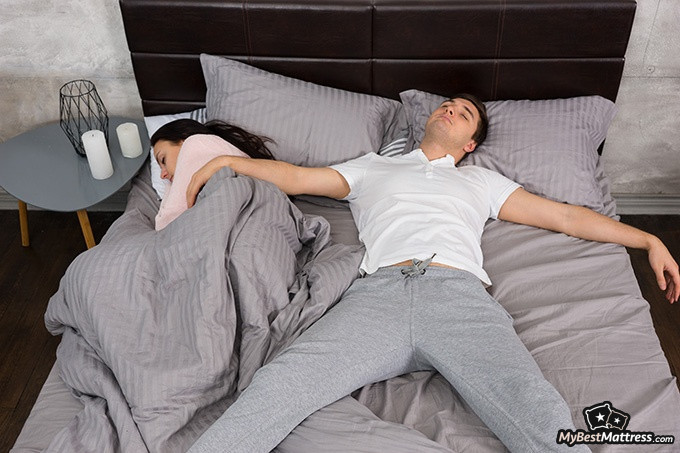
Nasal Blockage
As mentioned previously, restricted airways that lead to open-mouth breathing can often result in drooling in your sleep. This includes nasal blockages, such as a stuffy nose.
Even if you don't feel congested during the day, the story can drastically change at bedtime. As we lay down, our old friend gravity no longer drains the mucus from our nasal cavity, resulting in a stuffy nose.
Now, I know how tempting it is to just use a nasal spray before bed and forget your stuffy troubles. But nasal congestion should not be ignored. As annoying as congestion is, often occurring nasal blockages can be a sign of something more than just a cold.
Sure, it might just be a seasonal bug that will most likely go away on its own. Alternatively, however, a wet pillow from a stuffy nose might be a sign of a sinus infection, which, if left untreated, could lead to some nasty complications, such as nasal polyps.
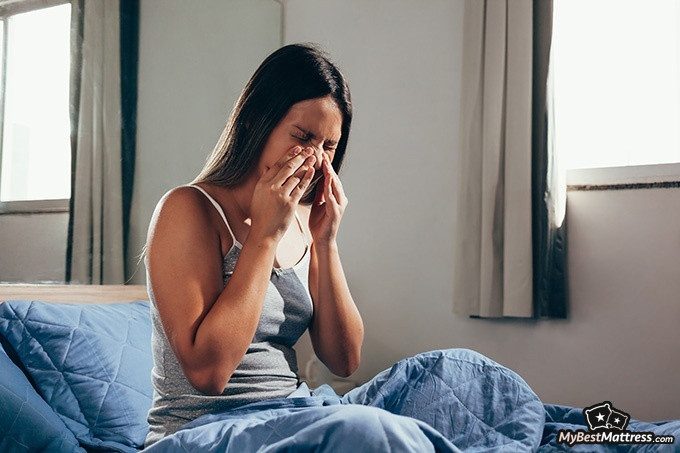
Either way, if you're bothered by the dynamic duo of a stuffy nose at night and drooling in your sleep, talking to a medical professional can help you avoid a lot of unnecessary discomforts.
Allergies
Similarly to the flu or sinusitis, allergies can also be to blame for nightly slobbering. With that being said, however, dealing with allergies might not be as simple as with the common congestion.
Like many other reasons listed in this article, allergies lead to drooling in your sleep by restricting usual nasal breathing and encouraging breathing through your mouth. In fact, several different allergic reactions can cause drooling while sleeping:
- Irritated airways, especially nasal cavities, can encourage an overproduction of mucus, leading to congestion;
- Similarly, watery eyes, as tear ducts are connected to the nasal cavity, can make the sinuses swell up, again, restricting regular breathing through your nose;
- More serious allergies can make the throat and esophagus irritated and swollen. This encourages overproduction of saliva to soothe the discomfort, which can end up overflowing out of your mouth and onto the pillows.
This can be important to note if all other options are eliminated, especially as some allergies might go unnoticed. Even though drooling while asleep does not indicate any life-threatening reactions, knowing what allergens should be avoided can save you from a world of discomfort and very wet pillows.
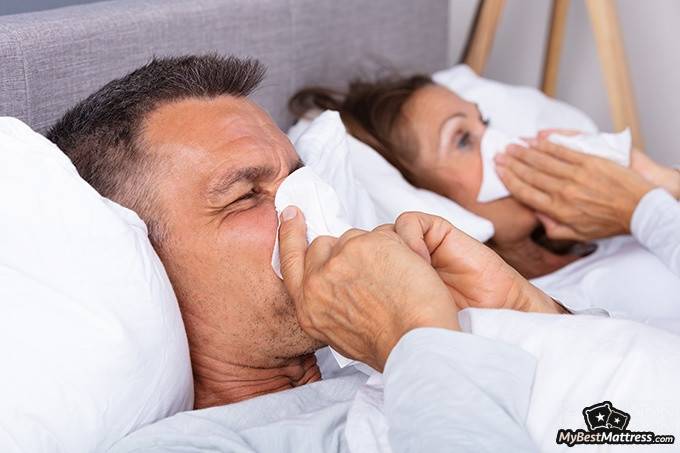
A Side Effect of Medicine
Sometimes the reason behind a saliva-covered cheek in the morning isn’t a condition at all. In fact, it can be the exact thing that is supposed to make you feel better - medicine.
Now, we all know that prescription medications can have all kinds of side effects - from unwanted pimples to an uncontrollable craving for pickles and whipped cream. And it just so happens that drooling while sleeping is one of them!
If your previous “how to stop drooling” searches lead you nowhere, the chances of your current prescription being at fault are quite high.
Truth be told, not all prescription medication can cause drooling in your sleep, but there are some that should be kept in mind if the drug-induced sialorrhea[2] is getting out of hand:
- Clozapine, an antipsychotic drug, is often reported to increase excess drooling while sleeping;
- Another common culprit is direct and indirect cholinergic agonists, usually used as dementia and Alzheimer’s medication, that can lead to regular night-time drooling.
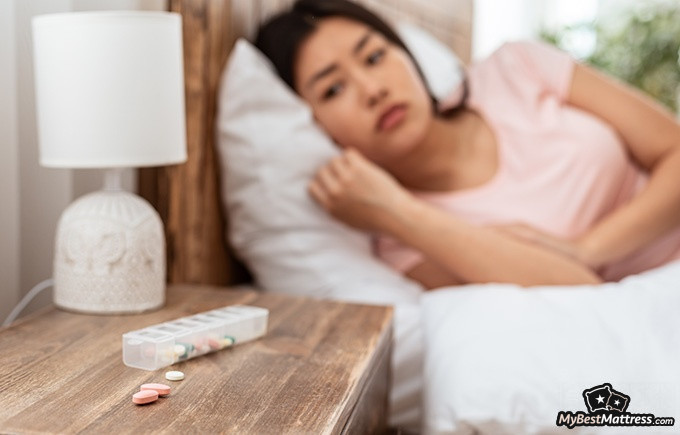
That being said, side effects are not a one-size-fits-all thing. Just because others reported drooling in their sleep while taking that medication, it might not be the case for you or your loved ones.
How to Stop Drooling?
We’ve discussed quite some reasons that might cause drooling in your sleep. Now that you know exactly what is leading to the uncomfortable occurrence, time to grab the bull by the horns and find out how to stop drooling all together.
So, time to move on from "why do I drool when I sleep?" to "how to stop drooling in your sleep".
Sleep Apnea
As mentioned before, sleep apnea is no laughing matter. Even though it might lead to some annoying side effects, such as snoring or the dreaded drooling in your sleep, it is recommended to prioritize long-term solutions and seek treatment as soon as you start suspecting sleep apnea.
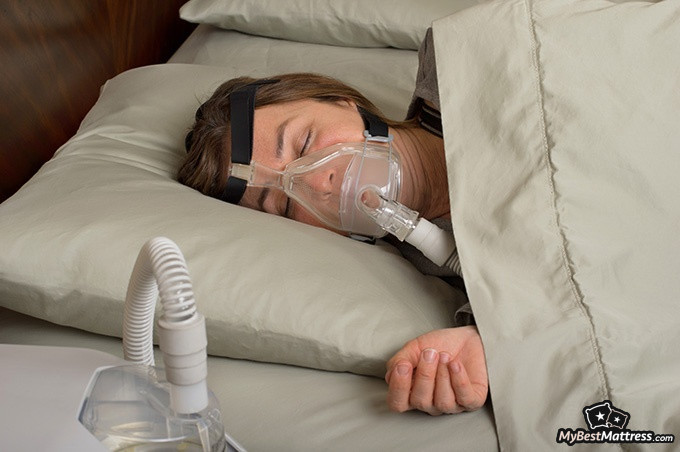
If your main goal is to find out how to stop drooling, one of the methods to quickly alleviate sleep apnea and the slobber caused by it is by sleeping with breathing assistance. Continuous positive airway pressure (CPAP) is the most common method used to help those suffering from sleep apnea, as it encourages a continuous flow of air through the respiratory system.
Of course, sleeping while hooked up to a breathing machine does not sound like you will be getting a good night’s rest. However, sleep apnea can be treated by eliminating the causing factors, in turn stopping the drooling.
Sleep apnea is most common in overweight and obese patients, as excess fatty tissue can restrict the airways. With just a few hours of exercise every week and healthy eating you can forget that drooling caused by sleep apnea was ever a concern of yours!
Latest Saatva Coupon Found:
UP TO $500 OFF
Limited-time Saatva Sale
We're sharing a limited-time Saatva mattress discount with our readers! Grab this deal & enjoy your new mattress with huge discounts.
Asthma
As asthma is a chronic condition, not much can be done to completely get rid of it. But don’t worry, there are still steps you can take to make drooling in your sleep bother you less.
Perhaps the simplest way to lower your chances of waking up with a damp cheek is using your inhaler right before bed. This will calm the irritation down and make a middle-of-the-night asthma attack much less likely.
This, of course, is not a permanent answer to the question of how to stop drooling. However, this method can definitely help with the discomfort.

Did you know?
Have you ever wondered which mattresses are approved as the best for sleep?
See & compare TOP mattresses side by sideGERD
Whether you’re dealing with occasional reflux after a heavier dinner or GERD, you can stop worrying about how to stop drooling, as there are several options available.
Naturally, the most obvious solution is avoiding eating foods that can encourage reflux, if not altogether, at least for dinner. In addition, having your last bite at least three hours before your bedtime can lower the chance of acid overflowing into the esophagus.
In addition, certain foods are known to actually help with acid reflux. Incorporating lean meats, egg whites, healthy fats, and, believe it or not, ginger, are proven to help manage acid reflux.
That being said, there are more medicinal routes you can take if you’re dealing with GERD or suspect acid reflux to occur that night. Prescription and over-the-counter medication can be taken before bed to soothe acid reflux, in turn making you less likely to produce excess saliva at night.
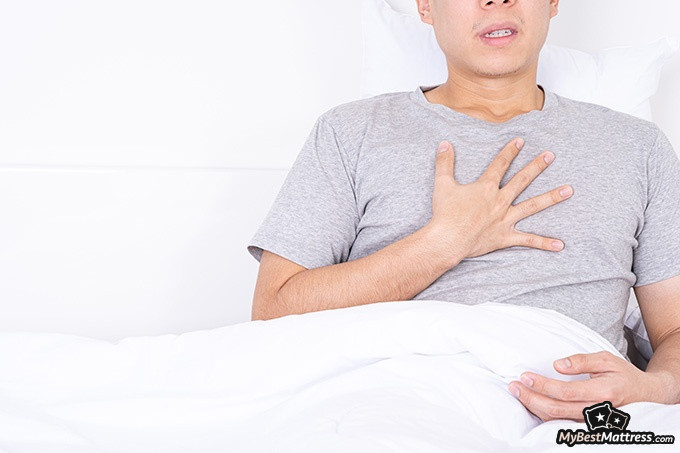
In any case, it is best to discuss possible steps with your doctor to assure the best results.
Sleeping Position
Now, I know what you must be thinking. How on earth can you control how you sleep when you’re not aware of it in the first place?
Well, believe it or not, there are some options! And, in fact, it’s most likely to be the answer to your worries over how to stop drooling.
The easiest way to make sure you stay sleeping on your back throughout the night is using a pregnancy body pillow. Commonly used by expecting women to assure comfort during the final months of the term, these long soft pillows are designed to offer maximum support in your sleep.
If you’re not looking to invest in something like that, however, a simple solution is using regular pillows to prop yourself up in order to make sure you stay I the most drool-proof position possible.
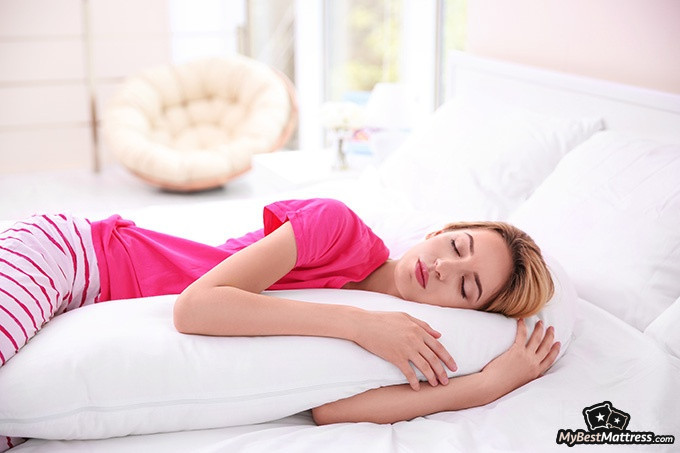
In general, a high-quality pillow that offers support and comfort in one fluffy package is one of the best investments you can make. If you’re looking for the cream of the crop, then Saatva pillows are definitely worth your attention!
Nasal Blockage
If you’re suffering from congestion, not only can it encourage drooling while sleeping, but make your sleep quality drastically decrease as well. Getting up at night to blow your nose makes you lose valuable hours of shuteye, and not everyone can actually rest in a more vertical position.
If your sleepy slobbering is caused by nasal blockages, there’s no harm in using nasal sprays before bed to make sure you can get some good, dry sleep.
That being said, regular or heavy use of sprays can dry out your nasal canals, ultimately leading to some discomfort. If you’re looking for a gentler, more natural approach to aid in congestion, taking some time to enjoy steam inhalation can do wonders.
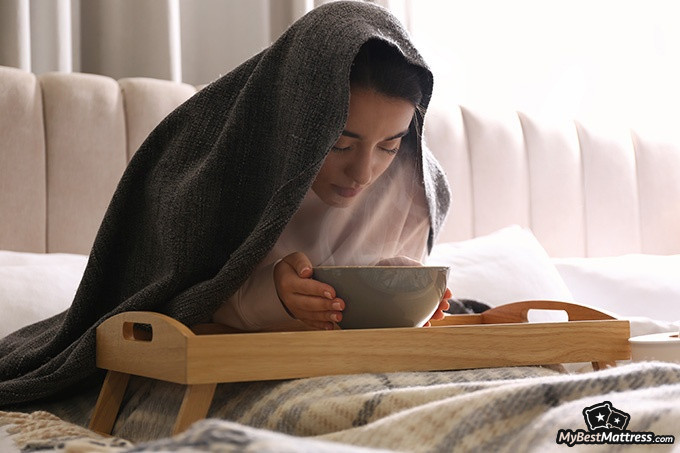
It not only gently unclogs sinuses without irritating the inside of your nose, thus freeing you from drooling in your sleep, but can also help fight acne and even relieve stress! Need I say more?
Allergies
When it comes to allergies flaring up I can confidently speak from experience - you can put all of your efforts into avoiding possible allergens, but as soon as you think you’re safe for the day something random decides to cause a very unwelcome reaction.
And additionally, if you’ve been living with allergies for a while you might not be happy to hear another person say “just take your medication”, even if that is often the only way to help ease the discomfort.
If drooling while sleeping made you notice allergy flare-ups more commonly occurring at night, it might be time to consider what in your sleeping environment could be causing the reaction. Oftentimes old bedding, pillows, or even mattresses can irritate the body, causing watery eyes, a stuffy nose, and, you’ve guessed it, drooling in your sleep.
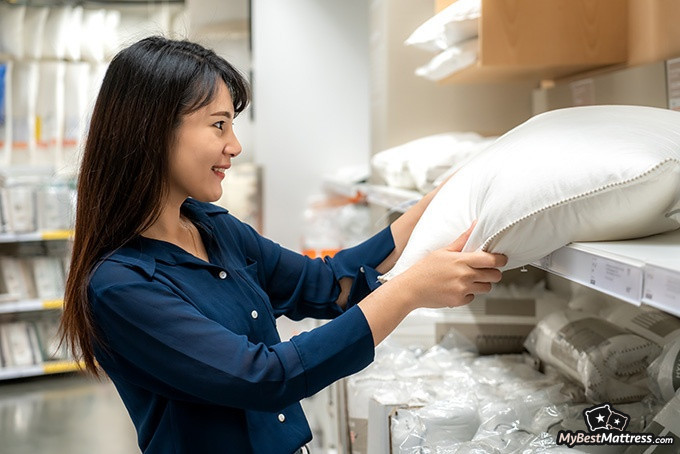
If you’re unsure if your pillow should be replaced, you can find all the information you need in this guide.
A Side Effect of Medicine
If it just so happens that the reason for your drooling in your sleep is an unpleasant side effect of a medication you’re taking, there isn’t much you can do without consulting your doctor.
This doesn’t necessarily mean you should avoid that specific pill like the plague. Depending on the situation, your GP could correct the dose you’ve been taking or prescribe additional medication to take in tandem.
Remember, your health and comfort are your doctor’s top priority, so going to them can do you a world of good - even if it seems like drooling while sleeping is too trivial to seek medical attention.
What Is The Best Sleeping Position?
In many cases the position you sleep in plays a big role in causing you to drool in your sleep. But did you know that it can influence other aspects of your health, too?
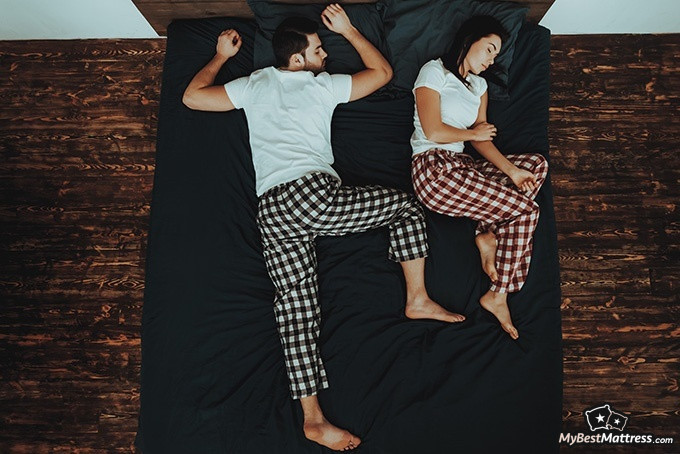
- With all of these health benefits, it’s little surprise that sleeping on your side is the most common sleeping position. Not only can it help with snoring and is super comfortable, but sleeping on your side, especially on the left one, can help reduce night-time heartburn!
- Sleeping on your back, however, offers the most health benefits out of all sleep positions. The list includes reducing back, neck, and knee pain, and even helping keep your skin youthful and plump. With that in mind, it might not be great for those with sleep apnea or who are prone to snoring, as laying on your back often restricts the airways.
At the bottom of the list is sleeping on your stomach. Though often the coziest, it offers more cons than pros. For example, it can cause neck and spine pain and even stop your muscles from fully resting, having you wake up sore and stiff. And of course, stomach sleepers are the most likely to drool in their sleep. So it’s definitely time to flip back face-up!
Conclusions
Whether we’d like to admit it or not, everyone has woken up to a puddle of drool on their pillow at least once in their lives.
In this article, we took a deep dive to find out how to stop drooling while we sleep. Aside from the most pleasant cause - resting so well we can’t control our drool - there are other, more serious reasons behind drooling while sleeping.
From possibly life-threatening sleep apnea to the occasional unwanted side effect of a medication, drooling in your sleep should not be ignored, as it can be pointing to something that requires attention from a medical professional.
At the end of the day, one thing should be kept in mind at all times. It doesn’t matter what is causing you to drool in your sleep. The important thing is that drooling in your sleep is completely normal and is nothing to be embarrassed about.
After all, everybody drools!
I hope that you found this article helpful and you now know exactly how to stop drooling. And until we meet again, I wish you sweet dreams and dry pillows!
Scientific References
1. Skarpsno, E. S., Mork, P. J., Nilsen, T., & Holtermann, A. 'Sleep positions and nocturnal body movements based on free-living accelerometer recordings'
2. Freudenreich O. 'Drug-induced sialorrhea'
Leave your honest feedback
Leave your genuine opinion & help thousands of people to choose the best mattress. All feedback, either positive or negative, are accepted as long as they’re honest. We do not publish biased feedback or spam. So if you want to share your experience, opinion or give advice - the scene is yours!



